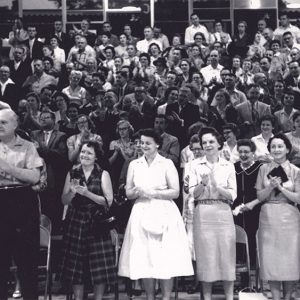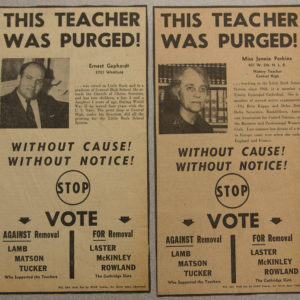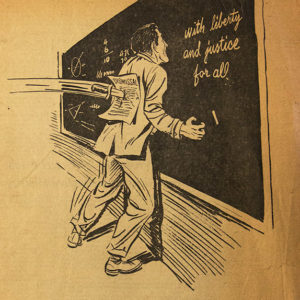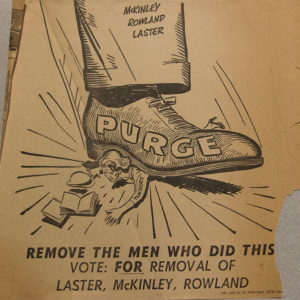calsfoundation@cals.org
Stop This Outrageous Purge (STOP)
A hastily formed organization created during the “Lost Year” of 1958–59—in which Little Rock (Pulaski County) public schools were closed in the wake of the desegregation crisis at Little Rock Central High School—Stop This Outrageous Purge (STOP) emerged as a powerful local counterweight to segregationists. The group successfully challenged the dominance of segregationists on the Little Rock School Board, and their efforts marked a turning point in the city’s desegregation controversy.
In September 1958, citing the recent passage of state laws designed to avoid further integration, Governor Orval Faubus closed Little Rock’s four high schools: Central High, Hall High, Little Rock Technical High, and Horace Mann. Black and white students were thus denied public education for an entire school year. This only served to exacerbate racial tensions within the city, dividing segregationists, integrationists, and moderates. The latter group—which did not necessarily support integration but instead opposed Faubus’s flouting of federal courts—formed the core of STOP.
On May 8, 1959, after moderate board members had walked out of the meeting in protest, segregationist board members held a rump session to fire forty-four teachers whom they believed to be supporters of integration and thereby a threat to the status quo. The dismissal of these teachers touched a nerve among many in Little Rock’s business and civic community, most of whom had been reluctant to speak out during the Central High crisis. Roughly 180 Little Rock residents attended a meeting at the Union Bank Building to organize a recall effort aimed at ousting segregationists from the school board. STOP emerged out of this meeting. Many of its members were the husbands of members of the Women’s Emergency Committee to Open Our Schools (WEC), which had stridently opposed Governor Faubus’s decision to close Little Rock schools. Irene Samuel, a prominent member of the WEC, served as STOP’s executive secretary. Vivion Brewer, Pat Murphy, Adolphine Terry, and Gaston Williamson, along with Samuel, were among the key members of the WEC.
As STOP began a petition drive to garner mass support for a recall, a group known as the Committee to Retain Our Segregated Schools (CROSS) formed in opposition to STOP. CROSS launched its own effort to recall the three remaining moderate board members. On May 25, 1959, the recall vote was held, resulting in a narrow victory for STOP. The three moderate board members were retained by margins ranging from 50.8 percent to 52.4 percent, and the board’s three segregationists were removed from the board by equally tight margins. As Bob Douglas, managing editor of the Arkansas Gazette at the time, later related, STOP’s victory in the recall marked the first real setback for Governor Faubus: “Although he went on to remain in the governor’s chair for a long, long time…after that he never had the power that he’d had.”
On June 11, 1959, the Pulaski County Board of Election Commissioners appointed three new members to the Little Rock School Board, thus shifting control of public schools toward moderates. Out of the forty-four teachers and administrators who had been fired, thirty-nine were rehired. A week later, the U.S. District Court declared the 1958 closing of schools to be unconstitutional, and in accordance with this ruling, the Little Rock School District announced that schools would re-open in the fall of 1959. Although STOP soon disbanded, many of its members continued to actively participate in Little Rock politics.
While STOP achieved its immediate goal of reversing the dismissal of teachers, the group also posed a direct challenge to segregation in general and helped awaken the previously dormant business community of Little Rock to the economic consequences of sustaining school segregation.
For additional information:
Jacoway, Elizabeth. Turn Away Thy Son: Little Rock, the Crisis That Shocked the Nation. New York: Free Press, 2007.
Kirk, John A. Redefining the Color Line: Black Activism in Little Rock, Arkansas, 1940–1970. Gainesville: University of Florida Press, 2002.
Miller, Laura A. Fearless: Irene Gaston Samuel and the Life of a Southern Liberal. Little Rock: Center for Arkansas Studies, University of Arkansas at Little Rock, 2002.
Murphy, Sara. Breaking the Silence: Little Rock’s Women’s Emergency Committee to Open Our Schools, 1958–1963. Fayetteville: University of Arkansas Press, 1997.
The Lost Year Project. http://www.thelostyear.com/ (accessed August 11, 2023).
Brent E. Riffel
University of Arkansas, Fayetteville
 STOP Rally
STOP Rally  STOP Ads
STOP Ads  STOP Ad
STOP Ad  STOP Ad
STOP Ad 




Comments
No comments on this entry yet.